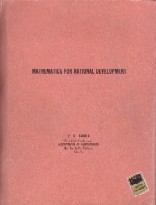|
Mahal Kong Dating Estudyante Ko,
Kumusta Kayo? Matanda Tayo! How did we get so old, so fast ba? Can you believe that it's been over thirty years since we last met?!!
Over the past thirty years I've taught innumerable fantastic students -- from Boston to Bangalore, from Hong Kong to Athens. But I am very sincere when I say that of all my students, you were the brightest and most diligent (atsaka mabait kayo pa!).
Perhaps I'm biased because you were my first students. Not knowing any better, I made enormous demands of you. I didn't realize at the time that my demands were unrealistic. So what did you do? You met and exceeded my demands! I can only hope that the experience wasn't too traumatic for you. (OK, kung kunti lang ang trauma!)
I'm now at an age where I've started writing about some of my life experiences. And so I'm writing this letter to you; I want you to know something about what we accomplished all those many years ago.
* * *
From 1971 to 1974 I was an assistant professor of mathematics at De La Salle College, Manila (now De La Salle University). I was hired by the department chairman, Professor Salvador Roxas Gonzalez (see sidebar). I presented to Professor Gonzalez my vision of what I thought should be the mathematics curriculum for a college training the next generation of leaders in a third-world country. Although it might be too strong a statement to say that Professor Gonzalez shared the entirety of my vision, he was certainly sympathetic to, and supportive of my vision.
Before describing this "vision," I should say something about my background at the time I joined La Salle. As I would relate in class, I had spent the prior four years working in the computer field. First as a computer programmer at the Manned Spacecraft Center in Houston, Texas and then as a member of the technical staff at Bell Telephone Laboratories in Holmdel, New Jersey. I was fortunate to have been exposed to the most advanced computer technology of that era.
|
|
ALTRICO Class Roster
With the exception of Mr. Bustamante (who still owes me a term paper), I believe the following is a complete roster of all students who successfully completed the ALTRICO class from 1971 through 1974. Comments from ALTRICO students are welcome and may be posted on this website. Mr. Bustamante is welcome to submit his term paper, however he may not expect full credit!
Agcaoili, K. K.
Alano, M. M.
Aldanese, Ma. P.
Aleantara, E. P. L.
AngSiy, H.
Arellano, A. A.
Arellano, P. A.
Atienza, A. T.
Barredo, M. I.
Bernardo, Alejandro
Breseno, Jr., L. A.
Butac, C. R.
Caacbay, D. A.
Calasanz, M. T.
Calero, E. L.
Calleja, E. P.
Carangal, R. F.
Cardenas, M.
Castro, R. C.
Chua, D. T.
Chuakaw, R.
Concepcion, G. Ma. Q.
Cu, W. V.
Custodio, E. O.
de Jesus, M. V.
de la Pena, P.
De Las Alas, R. B.
del Rosario, E. S.
Favorito, Glenn P.
Fermin, R. E.
Filamor, Gerardo R.
Go, E. C.
Gochuico, R. S.
Gonzalez, R. L.
Gotuaco, P.
Guillen, Herman V.
Hipolito, Vincente J.
Huang, P. S.
Isaac, U.
Jalandoni III, M. J.
Kilayko, G. U.
la O, B. C.
Lat, Renato L.
Lee, A. L.
Legarda, B. L.
Leon, Raul
Liao, Franklin Lim
Liao, H. L.
Lim, John
Lim, Ronald L.
Lucas, L. C.
Mangahas, Roberto L.
Marquez, Noel Q.
Mercado, B. D. Y.
Miranda, T.
Montelibano, A. G.
Morales, R. V.
|
Mundin, B.
Neri, C. A.
Ng Choy, A. H.
Oliveros, P. A.
Ong, L. L.
Opulencia, R. G.
Orbino, W. S.
Ortuoste, V. P.
Padilla, Ramoncito H.
Paliza, A. C.
Pasia, A. O.
Patenia, A. F.
Pena, Eduardo K.
Posadas, J. C. P.
Que, Jaime S.
Quiocho, E. T.
Rasgonio, R. E.
Rodriguez III, E. S.
Romero, V. M.
Rovira, Ma. M.
Sagles, Raul M.
Sagullo, Manuel R.
Salas, C. P.
Sanvictores, G. B.
Sapungan, Emmanuel
Sarte, Rene L.
Sayoc, J. V.
Schultz, John R. C.
Serrano, L.
Sison, Armando B.
Sogono, F. H.
Soliman, R. C.
Sta. Barbara, F.
Suplido, E. B.
Suplido, J. B.
Sy, Cirilo Y.
Sy, E. C.
SyCip, F. P.
Tagal, Caruso M.
Tan, M. S.
Tapawan, G. I.
Teves, J. R. V.
Trinidad, C. C.
Tuason, R. R.
Uy, J. L.
Uychaco, D. C.
Velez, E. A.
Veloso, J. J. S.
Villa, V. B.
Villarosa, C. S.
Villavicencio, R. V.
Wong, Johnny
Yam, A. S.
Yatco, Filemeno G.
Yu, Johnny
Yu, R. L.
Zayco, P. A.
|
|
 At La Salle, I incorporated computer technology into the standard curriculum for the first four semesters of college mathematics. There were no text books that supported this approach, so I assembled a hodgepodge of my own notes, as well as notes from various sources, into that dreadful orange book you may remember: Mathematics for National Development (a lofty title indeed!).
At La Salle, I incorporated computer technology into the standard curriculum for the first four semesters of college mathematics. There were no text books that supported this approach, so I assembled a hodgepodge of my own notes, as well as notes from various sources, into that dreadful orange book you may remember: Mathematics for National Development (a lofty title indeed!).